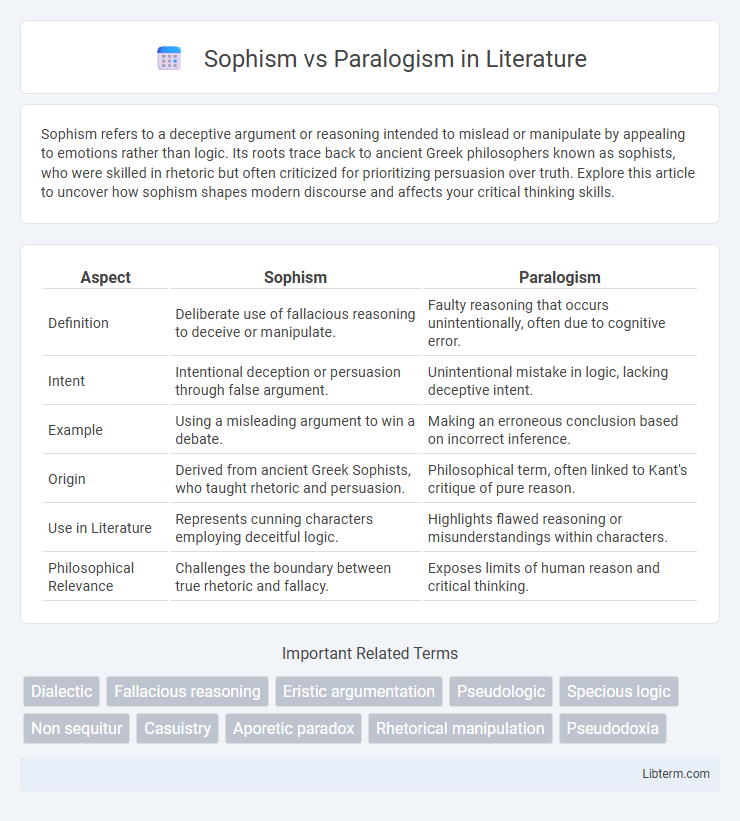Sophism refers to a deceptive argument or reasoning intended to mislead or manipulate by appealing to emotions rather than logic. Its roots trace back to ancient Greek philosophers known as sophists, who were skilled in rhetoric but often criticized for prioritizing persuasion over truth. Explore this article to uncover how sophism shapes modern discourse and affects your critical thinking skills.
Table of Comparison
| Aspect | Sophism | Paralogism |
|---|---|---|
| Definition | Deliberate use of fallacious reasoning to deceive or manipulate. | Faulty reasoning that occurs unintentionally, often due to cognitive error. |
| Intent | Intentional deception or persuasion through false argument. | Unintentional mistake in logic, lacking deceptive intent. |
| Example | Using a misleading argument to win a debate. | Making an erroneous conclusion based on incorrect inference. |
| Origin | Derived from ancient Greek Sophists, who taught rhetoric and persuasion. | Philosophical term, often linked to Kant's critique of pure reason. |
| Use in Literature | Represents cunning characters employing deceitful logic. | Highlights flawed reasoning or misunderstandings within characters. |
| Philosophical Relevance | Challenges the boundary between true rhetoric and fallacy. | Exposes limits of human reason and critical thinking. |
Understanding Sophism: Definition and Origins
Sophism refers to the use of fallacious arguments intended to deceive, originating in ancient Greece where Sophists were teachers of rhetoric and philosophy who prioritized persuasion over truth. Unlike paralogism, which involves a logical mistake made unintentionally within reasoning, sophism is characterized by deliberate manipulation of language to mislead opponents or audiences. Understanding sophism requires analyzing its roots in classical rhetoric and its impact on critical thinking and debate practices throughout history.
What is Paralogism? Key Concepts Explained
Paralogism is a form of faulty reasoning that appears logical but is fundamentally invalid due to hidden errors in its premises or inference. Unlike sophism, which deliberately uses deception to mislead, paralogism arises unintentionally from mistaken assumptions or flawed logical structures. Understanding key concepts such as non sequitur, invalid deduction, and fallacious argumentation is essential to identifying paralogism in philosophical and logical discourse.
Historical Development of Sophism and Paralogism
Sophism originated in ancient Greece during the 5th century BCE, characterized by itinerant teachers who employed rhetorical skills to persuade rather than to seek truth, influencing classical education and philosophical debates. Paralogism developed later as a term to denote fallacious reasoning or logical errors often contrasted against sophistic argumentation, gaining attention in medieval scholasticism and modern logic studies. The historical evolution of sophism and paralogism reflects shifting attitudes toward rhetoric, logic, and epistemology from antiquity through contemporary philosophy.
Core Differences Between Sophism and Paralogism
Sophism involves the deliberate use of fallacious arguments intended to deceive or manipulate, often prioritizing persuasion over truth. Paralogism refers to a logical error or flawed reasoning that occurs unintentionally, resulting from mistakes or misunderstandings rather than conscious deceit. The core difference lies in intentionality: sophisms are crafted to mislead, while paralogisms arise from genuine but incorrect thought processes.
Philosophical Impact of Sophism
Sophism significantly influenced philosophical inquiry by promoting critical thinking and rhetorical skill, challenging traditional notions of truth and knowledge through persuasive argumentation. Unlike paralogism, which is characterized by flawed reasoning or logical fallacies, sophism employs deliberate rhetorical strategies that often blur the line between truth and deception. This dynamic catalyzed the development of epistemology and dialectics, shaping the methodologies of Socratic and later philosophical traditions.
Paralogism in Logic and Reasoning
Paralogism in logic refers to reasoning that appears valid but contains a logical error, leading to false conclusions despite seemingly correct premises. Unlike sophism, which intentionally deceives with fallacious arguments, paralogism results from genuine mistakes or cognitive biases in the reasoning process. Understanding paralogisms is crucial for identifying subtle errors in deductive reasoning and improving critical thinking skills.
Famous Examples of Sophisms in History
Famous examples of sophisms in history include Zeno's paradoxes, which use seemingly logical arguments to challenge the concept of motion, and the Euthydemus dialogue by Plato, showcasing the deceptive arguments of two sophists. These sophisms rely on linguistic ambiguity and fallacious reasoning designed to confuse rather than reveal truth. The distinction between sophism and paralogism lies in sophisms being intentional fallacies used for persuasion, while paralogisms represent unconscious logical errors.
Common Paralogisms: Types and Instances
Common paralogisms often include affirming the consequent, denying the antecedent, and non sequitur fallacies, where conclusions do not logically follow from premises. These flawed reasoning patterns are distinguished from sophisms, which are intentionally deceptive arguments crafted to mislead. Examples of paralogisms appear frequently in informal debates and cognitive biases, revealing errors in critical thinking and argumentation structures.
Modern Relevance of Sophism and Paralogism
Sophism and paralogism remain relevant in modern discourse, particularly within critical thinking and argument analysis, where sophisms represent intentional fallacies aimed at persuasion, while paralogisms arise from unintentional logical errors. In contemporary settings such as political rhetoric, media debates, and online discussions, recognizing sophistic tactics helps in identifying manipulative arguments, whereas understanding paralogisms aids in assessing genuine reasoning mistakes. Their study enhances digital literacy and promotes more effective critical evaluation of information in an era dominated by rapid information exchange.
How to Identify and Avoid Sophism and Paralogism
Identifying sophism involves recognizing arguments that appear logical but rely on deception, misleading reasoning, or intentional ambiguity, often used to manipulate opinions. Paralogism can be spotted by detecting flawed reasoning or errors in inference that occur unintentionally, reflecting a mistaken but sincere belief rather than deliberate deceit. Avoid sophism and paralogism by critically analyzing premises for hidden assumptions, verifying logical consistency, and cross-examining evidence to ensure arguments adhere to valid principles of logic and facts.
Sophism Infographic

 libterm.com
libterm.com